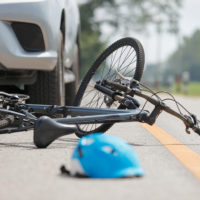Is A Bicyclist Considered A Pedestrian?

Florida roads are used by more people than any other state in the U.S. except for California, but pedestrians have historically had a difficult time in using many of them. The state has been ranked as the deadliest for pedestrians by nonprofits, but it is worth noting that the definition of ‘pedestrian’ does not always include bicyclists. Bicyclists occupy a sort of middle zone in Florida law; depending where they are being used, bicycles can be referred to as vehicles, or as pedestrians. If you are involved in an accident, it can be very relevant to determine which status you were occupying at the time.
Your Status Varies
The general rule of thumb under Florida law is that bicyclists are considered pedestrians if they ride on the sidewalk, and vehicle operators if they use the roads with motorists. This means that they must observe the relevant laws when they are in the relevant situation – for example, they must yield to other pedestrians on the sidewalk, and they must ride as far to the right as possible and use bike lanes where they exist.
Unfortunately, Florida has consistently been ranked among the deadliest states for pedestrian safety, which places bicyclists in danger even when they are not riding on the road. Smart Growth America, an urban planning think tank, estimates that almost 3 pedestrian fatalities (2.8) occur per 100,000 people every year in Florida, with the next highest numbers coming from Alabama, at 1.9 per 100,000 people. This is due to a host of factors, but a lack of infrastructure is a significant one – broken curb cuts and sidewalks, a lack of bicycle lanes, and missing streetlamps are some of the most commonly cited issues.
Seeking Compensation
If you are involved in an accident while on your bicycle, it is imperative that you remain aware of where you were riding, because that will govern the rights and responsibilities that you had at the time of the accident. For example, if you were riding in the road, a failure to ride in the bicycle lane would potentially be held against you in terms of contributory negligence – that is, it would be assumed that your conduct played a role in your own injuries, and if you recovered compensation, it would be reduced.
While you do have the option to file suit in court against the person who caused your accident if your injuries are severe enough, it is important to keep in mind that Florida is a no-fault auto insurance state. If you have an automobile, you are required to carry at least $10,000 of personal injury protection coverage and $10,000 of property damage liability coverage, and this follows the policyholder, not the vehicle. What this means is that even if you are not operating your own car at the time of an accident, you are generally able to use your PIP coverage to help pay your medical bills.
Contact A Tampa Bicycle Accident Attorney
Riding a bicycle is great exercise and is the favorite way that many Floridians keep active. However, the potential for injury is high if a bicyclist is involved in an accident with a vehicle. If you have been injured in this kind of accident, you likely have questions about how to get your bills paid and how to hold the person responsible to account. The Tampa bicycle accident attorneys from the Rinaldo Law Group are ready and willing to try and assist you. Call our offices today for a free consultation.
Resource:
smartgrowthamerica.org/dangerous-by-design/#custom-tab-0-7d982ae1eb29d3c473a33fa3c879ebe1
https://www.tampainjuryaccidentlaw.com/what-is-floridas-good-samaritan-law/
